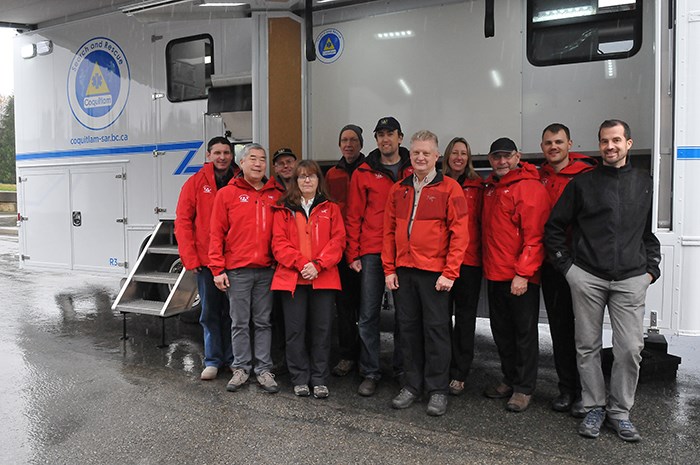It has been more than four years in the making, the product of countless meetings and determined fundraising efforts, but the work was worth it when Coquitlam Search and Rescue volunteers gathered to check out their new mobile command centre this week.
That so many of them could fit into the truck at once — 20 at one point — is the most obvious marvel after the cramped conditions of the old "bread truck" that served as their mobile command unit for the past two decades.
And while none would wish for the day when the new rig will be pressed into service, when it does come, the crew will be ready to tackle a search in even the most unforgiving conditions and locations.
"We've been drawing it and talking about it for a long time," Coquitlam SAR spokesperson Michael Coyle told The Tri-City News.
Every detail of the gleaming new truck has been planned to the tiniest detail, from the shell right down to the storage bins for energy bars.
Canopies extend off the side of the truck, providing shelter from heat and sun or rain. The hard canopy features built-in lighting shining on a large whiteboard where search info can be assembled outside, a drop-down shelf, storage compartments for large items like heavy-duty power cables and stretchers, as well as smaller compartments housing clear labelled bins containing everything from flares to bush saws.
Such a level of preparation — multiple layers of readiness for any number of situations in all sorts of weather conditions — is an occupational hazard of the SAR world, joked Coyle.
The same goes for the truck's interior.
One side is dominated by a row of computers; during a search, a volunteer would be at each machine monitoring emails and social media for word of the subject while others would focus on search teams and their locations.
A new bank of digital radios means that as searchers communicate with the command centre, the built-in GPS automatically pinpoints them on a constantly updating map.
The other side features sliding pin boards for maps — which come care of SAR volunteer and professional cartographer Steve Chapman — and a white board where all search info can be updated manually.
"There were incidents in the old truck where we'd lose power so we have a paper version of everything," Coyle said. "It's a mix of high tech and low tech. We don't want to rely too much on the high tech in case of a disaster."
There are two printers — one an 11x17 format that's perfect for printing maps that can be sent with searchers heading in to the field, noted SAR volunteer Sandy Burpee, and the other one that can print in a 36"-wide format of any length — for up-to-the-minute maps that need to be created on site.
There's a map drawer in the front and a meeting area in the back, plenty of light and windows.
"It's bright and clean, lots of big spaces and it's very heavy duty," said volunteer Kevin Ristau, who was familiarizing himself with the new radio system. "It has three times the capability of the old truck."
John Van Seters of Surrey's Intercontinental Truck Body (ITB) said the level of planning that went into the mobile command centre was beyond anything his company had worked on, including similar military and police vehicles.
"This group did an amazing job of balancing their budget and they got a highly effective and large vehicle at a very attractive price point," Van Seters said. "And that doesn't just happen. You have to watch every decision in the whole process."
Coyle and fellow volunteer Liz Clyne met with ITB weekly once production got underway last year but fundraising for the nearly half-million-dollar truck began more than two years ago.
About half of the funds came from a provincial gaming grant while nearly $100,000 came from the city of Coquitlam and a Spirit of Coquitlam grant. Additional donations came from Canadian Tire, Wesbild Holdings and the cities of Port Moody, Port Coquitlam and Burnaby.
One of the final finishing touches on the truck were plaques recognizing the donors, as well as volunteers who passed away before the truck could be finished: David Timewell, Roland Webb and Flynn Lamont.
[email protected]
@spayneTC



